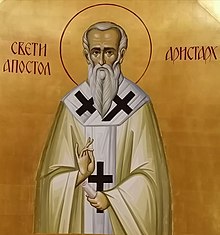Aristarchus of Thessalonica
Aristarchus of Thessalonica | |
|---|---|
 |
Aristarchus or Aristarch (Template:Lang-grc-gre Aristarkhos), "a Macedonian of Thessalonica" (Acts 27:2), was an early Christian mentioned in a few passages of the New Testament. He accompanied Saint Paul on his journey to Rome. Along with Gaius, another Roman Macedonian, Aristarchus was seized by the mob at Ephesus and taken into the theater (Acts 19:29). Later, Aristarchus returned with Paul from Greece to Asia (Acts 20:4). At Caesarea, he embarked with Paul on a ship of Edremit (Adramyttium) bound for Myra in Lycia (Acts 27:2); whether he traveled with him from there to Rome is not recorded. Aristarchus is described as Paul's "fellow prisoner" and "fellow laborer" in Colossians 4:10 and Philemon 1:24, respectively.
Background
In Eastern Orthodox and Eastern Catholic tradition, Aristarchus is identified as one of the Seventy Apostles and bishop of Apamea. He is commemorated as a saint and martyr on January 4, April 14, and September 27. He is mentioned in the Roman Martyrology on August 4.[1]
Aristarchus son of Aristarchus, a politarch of Thessalonica (39/38 BC?)[2] may be the same person with Aristarchus.[3][4]
References
- ^ "Roman Martyrology August, in English".
- ^ Greek inscription-IG X,2 1 30
- ^ Church and Community Conflicts: The Relationships of the Thessalonian, Corinthian, and Philippian Churches with their Wider Civic Communities Page 148 By Craig Steven De Vos ISBN 1-58983-007-5
- ^ An annotated bibliography of 1 and 2 Thessalonians By Jeffrey A. D. Weima, Stanley E. Porter Page 26 ISBN 90-04-10740-1
